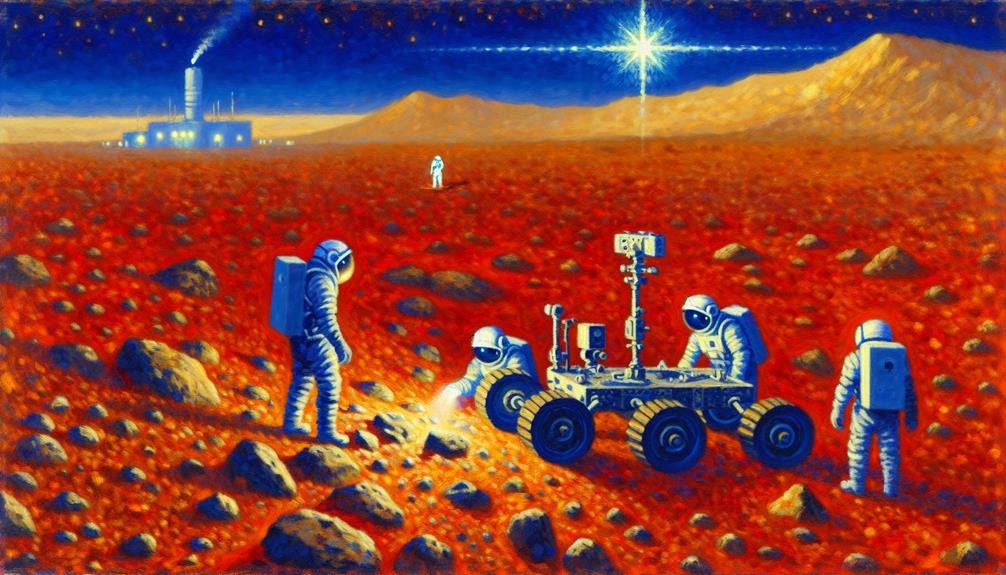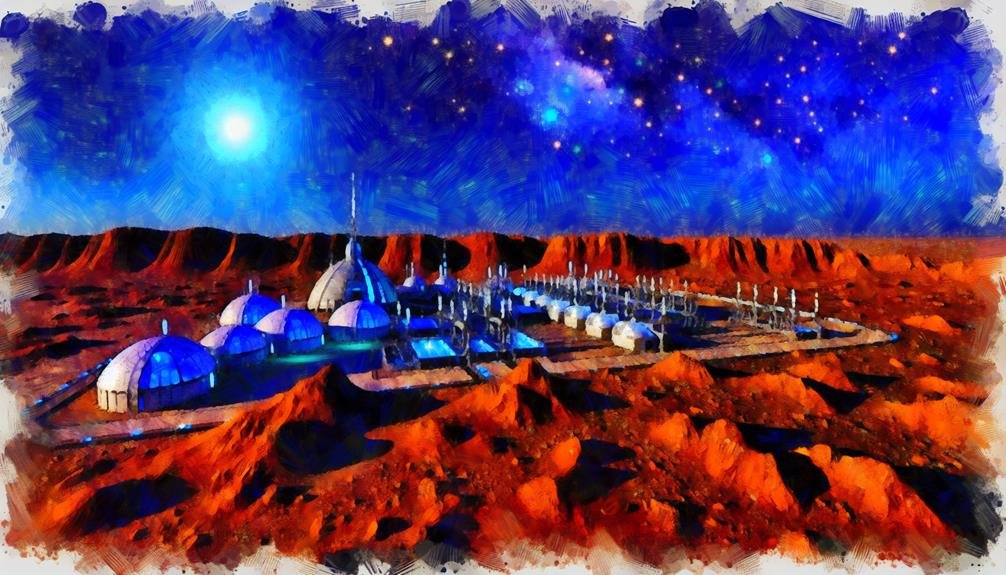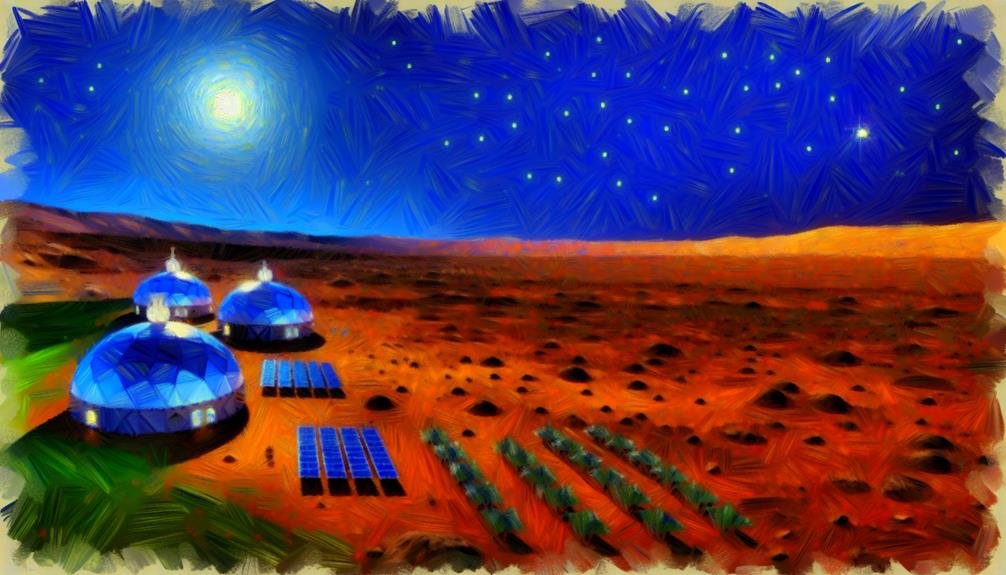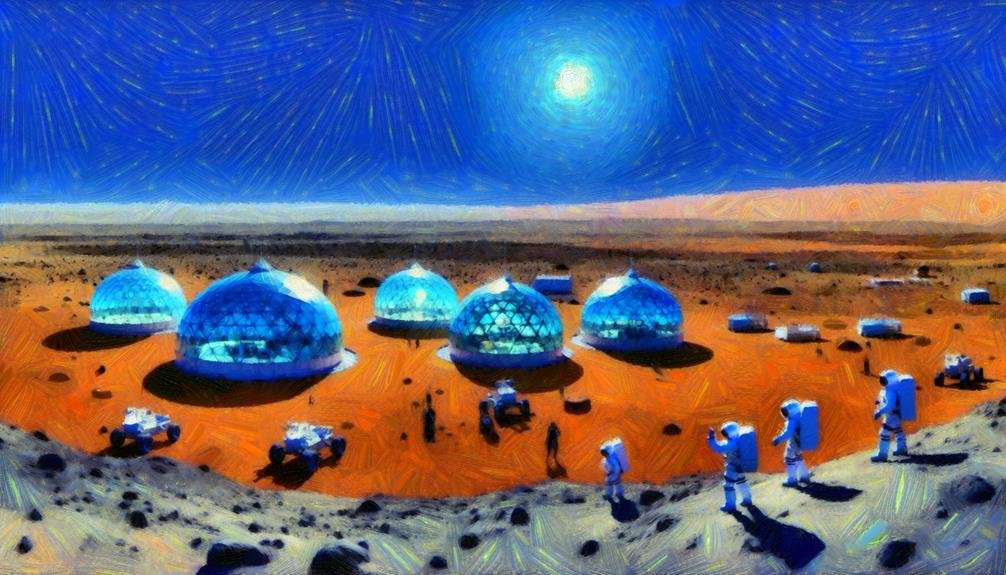Colonizing Mars offers numerous benefits including advancements in scientific research, space exploration, and technological innovation. It could enable resource mining and provide humanity with a safeguard against existential threats. However, the endeavor comes with significant challenges such as extreme environmental conditions, high radiation, and substantial financial costs estimated between $100 billion and $500 billion USD. Long-term sustainability requires breakthroughs in areas like food production and energy generation. Additionally, the financial return on investment remains uncertain. Understanding these intricate facets is essential for evaluating the viability and impact of establishing a human presence on Mars.
Takeaways
- Mars colonization pushes scientific research, technological advancement, and humanity's long-term survival.
- Extreme environmental conditions on Mars, including high radiation and thin atmosphere, pose significant health and safety challenges.
- Economic investments in Mars colonization can drive job creation and stimulate growth in the space industry.
- High financial costs and uncertain return on investment complicate the feasibility of Mars colonization.
- Technological innovations from Mars missions can lead to breakthroughs in sustainability and robotics applicable on Earth.
Advantages of Colonizing Mars
Colonizing Mars offers numerous advantages that can greatly benefit scientific research, technological advancement, and the long-term survival of humanity. Establishing a human presence on Mars greatly expands our capabilities in space exploration, allowing us to push the boundaries of what is currently possible. This initial step is a precursor to potentially colonizing other celestial bodies, thereby broadening our exploratory horizons and fortifying our understanding of the universe.
One of the key benefits of Mars colonization is the opportunity for resource mining. The Red Planet is known to harbor water ice and a variety of minerals, which could be vital for sustaining human settlements and fueling further space missions. These resources would not only support life on Mars but also potentially alleviate some of Earth's resource constraints through advanced extraction and transportation technologies.
Moreover, the technological advancements driven by the endeavor to colonize Mars can have far-reaching impacts on Earth. Innovations in sustainability, robotics, and life support systems developed for Mars missions could lead to significant improvements in those fields back home. Ultimately, Mars colonization provides a compelling backup plan for humanity, offering a safety net against existential threats to Earth's habitability.
Scientific Opportunities

The colonization of Mars presents unparalleled scientific opportunities for studying extraterrestrial environments and potential life forms. Mars exploration will greatly enhance our understanding of planetary evolution, offering a unique perspective on the climate history and geological processes that have shaped the Red Planet. These insights can be pivotal in astrobiology research, potentially uncovering evidence of past or present life on Mars, addressing some of the most fundamental questions about the origins of life.
Human presence on Mars can drastically expand the scope and depth of scientific investigations. Unlike robotic missions, which are limited by their programming and mechanical constraints, human researchers can adapt and respond to unexpected findings in real-time, enabling more dynamic and exhaustive studies.
| Scientific Opportunity | Potential Impact |
|---|---|
| Study of Extraterrestrial Environments | Insights into planetary conditions and habitability |
| Astrobiology Research | Potential discovery of life forms or biosignatures |
| Planetary Evolution | Understanding Mars' climate and geological history |
| Enhanced Scientific Investigations | More adaptive and responsive research capabilities |
| Broadening Knowledge of Universe | Revolutionary discoveries about our place in the cosmos |
The colonization of Mars could lead to groundbreaking discoveries, revolutionizing our perception of the universe and our role within it. Therefore, the scientific opportunities presented by Mars colonization are both profound and far-reaching.
Technological Innovations
Harnessing scientific opportunities on Mars necessitates groundbreaking technological innovations to guarantee the feasibility and sustainability of human colonization. Central to this endeavor are advanced life support systems, which are critical for ensuring a stable and habitable environment for astronauts. These systems include innovations in air filtration, water recycling, and food production, tailored to the harsh Martian conditions.
Robotics also play an indispensable role in Mars missions, with autonomous rovers and drones leading the way in exploration and preparation for human arrival. These robots are tasked with mapping terrain, identifying resource locations, and even conducting preliminary construction tasks, greatly reducing human risk.
Another cornerstone technology is 3D printing, which offers the potential to fabricate habitats and infrastructure using local Martian materials. This reduces the need for transporting vast amounts of building supplies from Earth, making the colonization process more efficient and sustainable.
Telecommunication advancements address the critical challenge of maintaining reliable communication between Earth and Mars, overcoming issues related to vast distances and signal delays.
Economic Implications

Furthermore, the economic implications of colonizing Mars encompass significant initial investment requirements, which are estimated to be around 500 million USD per mission.
In addition to these substantial costs, the potential for resource extraction on Mars could open new revenue streams and drive technological advancements.
This venture is also poised to create numerous job opportunities and stimulate the growth of a burgeoning space industry.
Initial Investment Requirements
Initial investment requirements for colonizing Mars are projected to be between $100 billion and $500 billion USD, encompassing spacecraft development, habitat construction, and life support systems. These initial costs represent a significant financial burden that must be meticulously planned and managed.
Mars colonization necessitates significant investment in cutting-edge technology for spacecraft development, ensuring safe and efficient transportation to the Red Planet. This includes not only the spacecraft itself but also the infrastructure needed to support human life during the journey and upon arrival.
The financial burden of these initial costs is considerable, but efforts by private companies like SpaceX and governmental agencies such as NASA aim to mitigate these expenses. By leveraging public-private partnerships, the financial load can be distributed, making the initial investment more manageable. These collaborations are important in pooling resources, expertise, and funding, ultimately driving down costs through innovation and economies of scale.
While the immediate financial requirements may seem challenging, it is essential to view this investment within the broader context of potential long-term economic benefits. Properly managed, the initial expenditure on Mars colonization could pave the way for future advancements and economic opportunities, justifying the substantial upfront costs.
Potential Resource Extraction
Exploring the economic implications of resource extraction on Mars reveals significant opportunities for mining valuable minerals such as iron, nickel, and cobalt. The establishment of mining operations on the Red Planet could lead to the extraction of Martian resources, offering a dual benefit: supporting human settlements on Mars and potentially exporting these resources back to Earth.
The availability of such valuable minerals could reduce the overall cost of future space missions by providing essential materials locally rather than relying on costly shipments from Earth.
Furthermore, the potential to create a new industry centered around the extraction, processing, and utilization of Martian resources is immense. This burgeoning sector could stimulate a wave of technological advancements, particularly in the mining and space exploration industries. Innovations in automated and remote-controlled mining operations, for instance, may emerge as essential technologies to overcome the unique challenges posed by Mars' environment.
In this context, resource extraction on Mars is not merely a scientific endeavor but a strategic economic initiative. The successful exploitation of Martian resources could usher in a new era of space economy, driving down costs and enabling sustainable human presence beyond Earth, all while fostering technological growth and economic development.
Job Creation Opportunities
As resource extraction on Mars paves the way for technological and economic advancements, it simultaneously opens up a plethora of job creation opportunities across multiple sectors. Establishing a human presence on Mars will necessitate an extensive workforce, revealing new professional avenues and stimulating economic growth.
Aerospace Engineering: The complex task of transporting materials and humans to Mars will drive demand for aerospace engineers specializing in interplanetary travel, spacecraft design, and propulsion systems.
Martian Agriculture: The need to sustain a human colony will create jobs in Martian agriculture, focusing on developing innovative methods to grow food in the harsh Martian environment.
Space Habitat Designers: Constructing livable habitats that can withstand Mars' extreme conditions will require specialized designers to create sustainable, safe, and efficient living spaces.
Resource Extraction and Manufacturing: Extracting and processing Martian resources will pave the way for manufacturing on Mars, further expanding job opportunities in mining, material science, and industrial engineering.
Beyond these primary sectors, the colonization of Mars will spur job creation in research, education, tourism, and other related fields, thereby contributing to sustained economic growth.
This multifaceted demand for specialized roles highlights the transformative potential of Mars colonization in reshaping the job market and fostering global economic advancement.
Risks and Challenges

Colonizing Mars presents an array of formidable risks and challenges, particularly due to the planet's extreme environmental conditions and the high financial costs involved.
The harsh Martian climate, with its intense radiation and lack of breathable atmosphere, poses significant threats to human health and survival.
Additionally, the immense expenditures required for technology development, transportation, and sustained operations make this endeavor financially challenging.
Extreme Environmental Conditions
Mars presents a formidable array of environmental challenges, including a thin atmosphere, subzero temperatures, and high levels of radiation. The absence of a protective magnetosphere results in continuous exposure to harmful cosmic and solar radiation, making the establishment of human colonies exceedingly difficult. The planet's environmental conditions necessitate significant technological advancements and robust infrastructure to guarantee human survival.
- Thin Atmosphere:
Mars' atmosphere is less than 1% as dense as Earth's, providing minimal protection against meteorites and radiation. This thin atmosphere also means that oxygen levels are insufficient for human respiration, necessitating life support systems.
- High Radiation Levels:
Due to the lack of a magnetosphere, Mars experiences high levels of radiation from cosmic and solar sources. Prolonged exposure to this radiation can lead to severe health problems, including cancer and radiation sickness.
- Toxic Perchlorates:
Martian soil contains toxic perchlorates, which pose significant health risks if inhaled or ingested. Decontaminating soil for agriculture or construction requires advanced technology and considerable effort.
- Harsh Environmental Conditions:
The combination of subzero temperatures, frequent dust storms, and low atmospheric pressure creates an environment that is inhospitable to humans and challenging for machinery, necessitating substantial protective measures.
High Financial Costs
The financial demands of Mars colonization present significant risks and challenges, necessitating robust funding strategies and meticulous budget management. Estimates place the cost of sending humans to Mars at around 500 million USD, posing a substantial financial burden for space agencies. The financial challenges are multifaceted, encompassing the development of new technologies, construction of necessary infrastructure, and sustaining human life on the Martian surface.
| Category | Description | Challenges |
|---|---|---|
| Initial Mission Costs | Estimated at 500 million USD | High financial burden |
| Technological Development | Investment in new technologies for travel and habitation | Potential budget overruns |
| Infrastructure | Building habitats, power systems, and life support structures | Funding risks |
| Sustainability | Long-term provision of food, water, and air for colonists | Long-term funding, uncertain return on investment |
Funding risks are compounded by the historically large budgets required for Mars exploration missions, with the potential for significant budget overruns. The uncertain return on investment further complicates the financial landscape, making it difficult to justify the enormous expenditure without clear, tangible benefits. To mitigate these risks, securing long-term funding is essential. This involves not only initial investments but also sustained financial support over the years required to establish and maintain a human presence on Mars. Without such thorough financial planning, the dream of Mars colonization may remain out of reach.
Long-term Sustainability

Achieving long-term sustainability on Mars necessitates innovative strategies for resource management and self-sufficiency. Sustainable practices are essential to prevent resource depletion and guarantee continuous resources for colonists.
Implementing innovative solutions is pivotal in areas such as food production, energy generation, and waste management. For instance, recycling resources and harnessing local Martian materials could greatly enhance self-sufficiency.
To maintain long-term sustainability, the following strategies can be considered:
- Food Production: Utilizing hydroponics and aeroponics systems to grow crops efficiently in controlled environments can reduce reliance on Earth-based supplies.
- Energy Generation: Harnessing solar and possibly nuclear energy to provide a stable power supply is crucial for sustaining life and operations on Mars.
- Waste Management: Developing closed-loop systems where waste products are recycled and repurposed can minimize environmental impact and resource wastage.
- Resource Utilization: Extracting and processing local Martian materials for construction and manufacturing can reduce the need for shipments from Earth.
Ensuring the longevity of Martian colonies also involves careful planning and adaptation to the harsh Martian environment. Resilience to unforeseen challenges and the ability to adapt to dynamic conditions will be essential for the success and sustainability of human presence on Mars.
Frequently Asked Questions
What Are the Pros of Colonizing Mars?
Colonizing Mars offers numerous advantages, including fostering technological advancements, enabling space tourism, and facilitating resource extraction. Additionally, it supports human expansion and provides unparalleled opportunities for scientific research, thereby advancing our understanding of the universe.
What Are the Pros and Cons of Going to Mars?
The pros of going to Mars include technological advancements and fostering global teamwork. Conversely, the cons encompass ethical considerations and significant terraforming challenges, potentially impacting space tourism and highlighting the immense difficulties of sustainable colonization.
What Are the Disadvantages of Colonizing Mars?
Colonizing Mars involves significant disadvantages, including radiation exposure, psychological stress, resource scarcity, and technological challenges. Additionally, there are concerns about the environmental impact on Martian ecosystems and the ethical implications of potential resource exploitation.
What Were the Pros and Cons of Colonization?
The pros and cons of colonization involve ethical dilemmas, environmental impact, resource allocation, space governance, and human adaptation. These factors must be carefully considered to balance scientific and economic benefits with potential risks and ethical concerns.
Conclusion
Colonizing Mars presents significant scientific opportunities, fostering technological advancements, and offering potential economic benefits.
However, it also entails considerable risks and challenges, particularly regarding long-term sustainability.
The endeavor requires meticulous planning, robust technological solutions, and a thorough understanding of Mars' environment.
While the potential rewards are substantial, the feasibility of maintaining a human presence on Mars necessitates a careful evaluation of both the advantages and the inherent obstacles to guarantee the success of such an ambitious venture.

